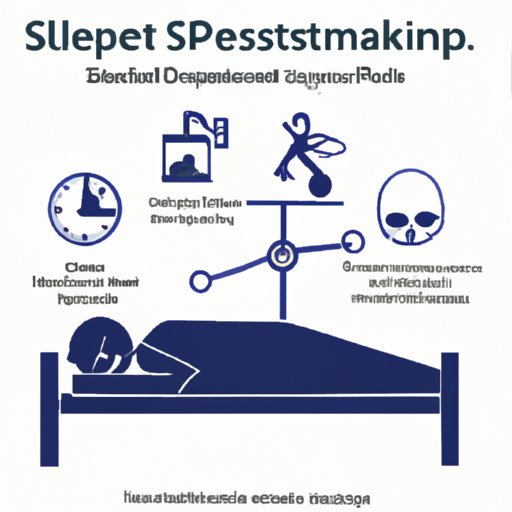
I. Introduction
Sleep is a crucial component of overall health and well-being. It is essential for proper brain function, emotional stability, and physical health. However, many people struggle with getting enough sleep and may not fully understand how much sleep they need. In this article, we will explore age-specific sleep recommendations and provide tips for improving sleep quality.
II. The Science of Sleep
Sleep consists of several stages, including light and deep sleep and rapid eye movement (REM) sleep. During deep sleep, the body repairs and regenerates tissues and muscles, while REM sleep promotes brain function and emotional processing. Sleep plays a critical role in regulating bodily functions such as appetite, metabolism, and immune function.
III. Age-Specific Sleep Recommendations
Newborns and Infants: On average, newborns need 14-17 hours of sleep per day, while infants require 12-15 hours. They typically sleep in multiple short periods throughout the day and night.
Toddlers and Preschoolers: Toddlers and preschoolers need 11-14 hours of sleep per day, often in the form of a daily nap plus nighttime sleep. Their sleep patterns tend to become more regular as they get older.
School-Age Children and Teens: School-age children require 9-11 hours of sleep per day, while teens need 8-10 hours. However, many teens struggle to get the recommended amount of sleep due to busier schedules and electronic devices.
Adults: Adults should aim for 7-9 hours of sleep per day, although individual needs may vary. Adults may also experience changes in their sleep patterns due to stress, work schedules, or medical conditions.
Older Adults: Older adults require 7-8 hours of sleep per day, but they may experience changes in the quality and duration of sleep due to age-related factors such as medication use, chronic pain, and sleep disorders.
IV. Common Sleep Problems
Insomnia: Insomnia is a common sleep disorder characterized by difficulty falling or staying asleep. Causes may include stress, anxiety, depression, or chronic pain, and treatment may involve therapy, medication, or lifestyle changes.
Sleep Apnea: Sleep apnea is a sleep disorder that causes breathing interruptions during sleep. Risk factors may include obesity, smoking, and alcohol use, and treatment may involve lifestyle changes, medication, or surgery.
Restless Leg Syndrome: Restless leg syndrome is a condition that causes an uncomfortable sensation in the legs and an urge to move them, often disrupting sleep. Risk factors may include age, genetics, and chronic conditions, and treatment may involve medication or lifestyle changes.
V. Sleep Recommendations vs. Reality
Research suggests that most people do not get the recommended amount of sleep for their age group. Reasons may include stress, shift work, parenting responsibilities, or medical conditions. Chronic sleep deprivation can increase the risk of developing conditions such as obesity, diabetes, and heart disease and may impair cognitive function and emotional regulation.
VI. Strategies for Improving Sleep
Creating a relaxing bedtime routine, avoiding caffeine and electronic devices before bed, and getting regular exercise can improve sleep quality. Practicing good sleep hygiene, such as keeping a regular sleep schedule and maintaining a comfortable sleep environment, may also help promote better sleep habits.
VII. Sleep Aids and Treatments
Over-the-counter sleep aids may provide short-term relief for occasional sleep disruptions, but they should not be used long-term due to the risk of side effects. Prescription medications may be necessary for treating sleep disorders such as insomnia or sleep apnea, but they should only be taken under a doctor’s supervision. Lifestyle changes such as weight loss or smoking cessation may also help improve sleep quality.
VIII. Conclusion
Getting enough sleep is essential for maintaining overall health and well-being. By following age-specific recommendations and incorporating healthy sleep habits into daily routines, individuals can improve their quality of life and reduce the risk of health complications. If sleep problems persist, seeking professional help from a healthcare provider may be necessary.




